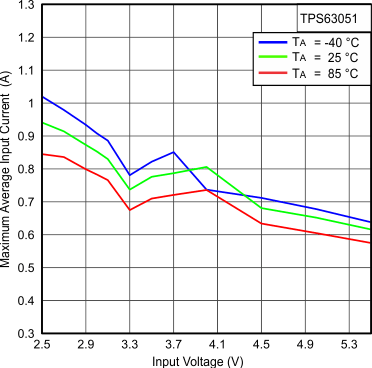SLVSAM8D July 2013 – August 2019 TPS63050 , TPS63051
PRODUCTION DATA.
- 1 Features
- 2 Applications
- 3 Description
- 4 Revision History
- 5 Device Comparison Table
- 6 Pin Configuration and Functions
- 7 Specifications
- 8 Detailed Description
- 9 Application and Implementation
- 10Power Supply Recommendations
- 11Layout
- 12Device and Documentation Support
- 13Mechanical, Packaging, and Orderable Information
Package Options
Mechanical Data (Package|Pins)
Thermal pad, mechanical data (Package|Pins)
Orderable Information
7.7 Typical Characteristics

| VOUT = 3.3 V |
(1) All options only available with the DSBGA package. For VQFN package ILIM1 is internally connected to voltage level > VIH

